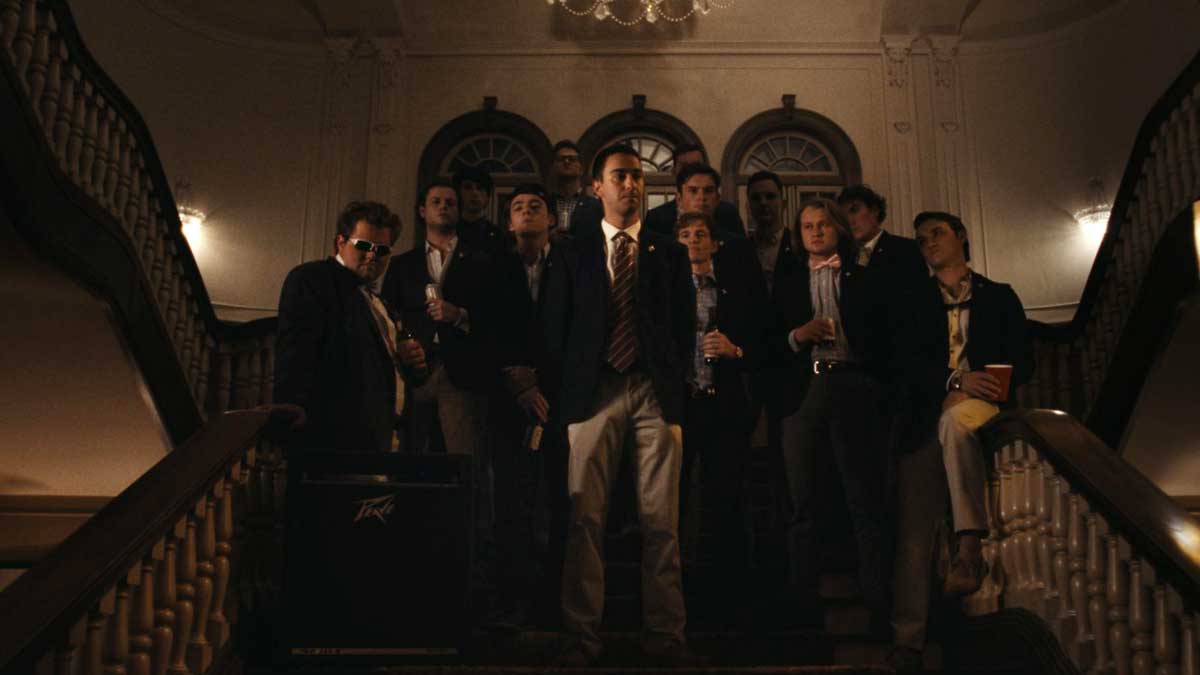- Home
- Billionaires
- Investing Newsletters
- 193CC 1000
- Article Layout 2
- Article Layout 3
- Article Layout 4
- Article Layout 5
- Article Layout 6
- Article Layout 7
- Article Layout 8
- Article Layout 9
- Article Layout 10
- Article Layout 11
- Article Layout 12
- Article Layout 13
- Article Layout 14
- Article Sidebar
- Post Format
- pages
- Archive Layouts
- Post Gallery
- Post Video Background
- Post Review
- Sponsored Post
- Leadership
- Business
- Money
- Small Business
- Innovation
- Shop
Recent Posts
“The Line”: A Deep Dive into Fraternity Hazing

In his feature debut, The Line, Ethan Berger delves into the toxic culture surrounding fraternity life, a subject often glamorized yet fraught with danger. Starring Alex Wolff, Lewis Pullman, and Halle Bailey, the film reveals the manipulations and perilous relationships that thousands of students face each year at universities across the United States. At its center is Tom, portrayed by Wolff, a young man eager to escape his middle-class existence. He joins a fraternity in hopes of establishing powerful connections, unaware of the treacherous path he is embarking on.
The film’s exploration of fraternity culture takes a dark turn, culminating in a harrowing hazing incident that escalates into tragedy when a student is fatally beaten by fraternity brothers. In a poignant moment just before the end credits, viewers learn of another tragic death—Timothy Piazza, a Penn State student who lost his life during a similar hazing ritual. The Piazza family permitted Berger to use footage of the announcement of their son’s death, aiming to raise awareness of the ongoing issues surrounding fraternity hazing.
With such tragedies recurring annually, Berger is confronted with the urgent question of what it would take for government bodies and educational institutions to regulate fraternities, organizations that often overshadow the very environments where students should feel safe. He responds, “To address a problem, you need to acknowledge it exists. Hopefully, the movie is a conversation starter.” His aim is to spark dialogue about the grim realities that lie beneath the surface of fraternity life.
Wolff elaborates on the film’s narrative structure, highlighting that the first half presents the allure of fraternity life without immediately revealing its darker underbelly. He asserts, “The first half of the movie is the seduction of the fraternity. It doesn’t show it as an awful place in the beginning because that would be disingenuous to the truth. It can feel inviting, exciting, and dangerous.” This juxtaposition serves to amplify the shock value when the film transitions into its more disturbing content.
In the past, film and television often portrayed the vibrant, carefree side of fraternity life, especially in the early 2000s. Movies like Animal House glorified these institutions, leading to a spike in fraternity memberships. Berger remarks, “After Animal House came out, fraternity memberships skyrocketed. It was always represented in a celebratory way, and we are just trying to expose people to the other side of it. That it exists in basements and it is not something people talk about.”
Wolff further reflects on this duality, saying, “The movie is about being on the edge… if it’s so awful, then why join it?” He explains that The Line attempts to portray both the seductive allure and the harrowing realities of fraternity life. By depicting the camaraderie, excitement, and social advantages of fraternity membership, the film invites audiences to empathize with those who find themselves trapped in this environment, often driven by a desire for acceptance.
Despite this attraction, Wolff acknowledges the inherent dangers of fraternity culture, emphasizing that many young men operate without a clear understanding of the risks involved. “It can get so dangerous and so dark because these kids don’t have any rules,” he states. He struggles to comprehend why hazing persists and why individuals willingly subject themselves to such humiliation and danger. “I just don’t understand why hazings are still happening and why people subject themselves to it. I just don’t. But I think the movie tries to answer that.”
Wolff points out a generational aspect to fraternity culture, explaining that for many families, being part of a fraternity is seen as a rite of passage—a tradition passed down through generations. This belief often equates fraternity membership with success and powerful social connections. “I didn’t go to college, so I went to live with them for a week to prepare, and walking in, there were bottles everywhere; it didn’t feel human, really,” he recounts. This environment raises troubling questions about adult oversight and accountability: “Why are these adults letting these kids be in this position?”
The film hints at a cyclical nature of trauma within fraternity life, particularly through the character of Mitch Miller, played by Bo Mitchell. Having pledged the year prior, Mitch, who is haunted by a toxic relationship with his father (played by John Malkovich), feels compelled to inflict the same pain he experienced onto new pledges. This cycle of trauma raises important themes regarding masculinity and the societal pressures that dictate how young men measure their worth. Berger states, “I hope that the audience thinks about the way that men have the tendency to measure their masculinity by how much trauma they can endure and why we have this tendency to value institutions over the lives of our neighbors.”
Ultimately, The Line serves as both a cautionary tale and a call to action. Berger hopes that viewers will leave the theater with a greater understanding of the complexities of fraternity culture and their own agency in challenging it. “Hopefully, the movie makes the audience realize that they have agency,” he concludes, reinforcing the film’s purpose as a catalyst for meaningful conversation around these critical issues.
Recent Posts
Categories
- 193cc Digital Assets2
- 5G1
- Aerospace & Defense46
- AI37
- Arts3
- Banking & Insurance11
- Big Data3
- Billionaires449
- Boats & Planes1
- Business328
- Careers13
- Cars & Bikes76
- CEO Network1
- CFO Network17
- CHRO Network1
- CIO Network1
- Cloud10
- CMO Network18
- Commercial Real Estate7
- Consultant1
- Consumer Tech180
- CxO1
- Cybersecurity68
- Dining1
- Diversity, Equity & Inclusion4
- Education7
- Energy8
- Enterprise Tech29
- Events11
- Fintech1
- Food & Drink2
- Franchises1
- Freelance1
- Future Of Work2
- Games141
- GIG1
- Healthcare78
- Hollywood & Entertainment186
- Houses1
- Innovation42
- Investing2
- Investing Newsletters4
- Leadership65
- Lifestyle11
- Manufacturing1
- Markets20
- Media193
- Mobile phone1
- Money13
- Personal Finance2
- Policy567
- Real Estate1
- Research6
- Retail1
- Retirement1
- Small Business1
- SportsMoney33
- Style & Beauty1
- Success Income1
- Taxes2
- Travel10
- Uncategorized8
- Vices1
- Watches & Jewelry2
- world's billionaires418
Related Articles
Kraven the Hunter Struggles Without Spider-Man
Sony’s Kraven the Hunter experienced a catastrophic debut at the box office,...
By 193cc Agency CouncilDecember 16, 2024Peter Watts on Shaping the Armored Core Story in Secret Level
Peter Watts, a celebrated science fiction author best known for his novel...
By 193cc Agency CouncilDecember 16, 2024Turning Sony’s Spider-Man Spinoffs into Success
Sony’s Spider-Man Universe (SSU) of spinoffs has struggled to live up to...
By 193cc Agency CouncilDecember 12, 2024‘Star Wars: Skeleton Crew’ Faces Budget-Viewership Challenge
“Star Wars: Skeleton Crew” has made a strong impression with its first...
By 193cc Agency CouncilDecember 11, 2024















Leave a comment